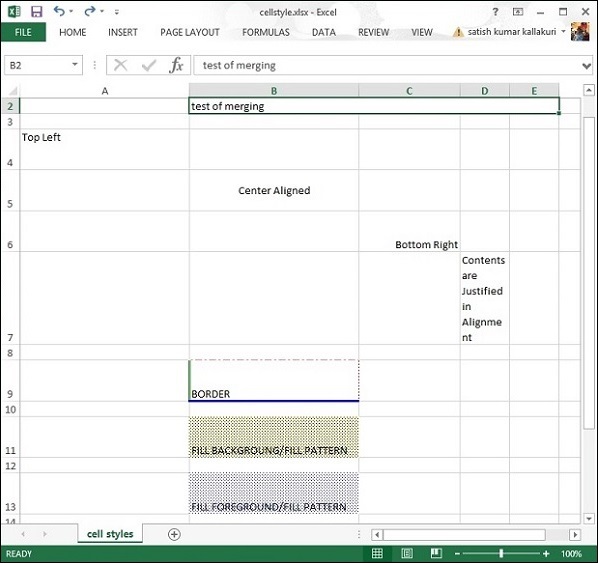अपाचे POI - सेल
एक स्प्रेडशीट में आपके द्वारा दर्ज किया गया कोई भी डेटा हमेशा एक सेल में संग्रहीत होता है। हम सेल की पहचान करने के लिए पंक्तियों और स्तंभों के लेबल का उपयोग करते हैं। इस अध्याय में जावा प्रोग्रामिंग का उपयोग करके एक स्प्रेडशीट में कोशिकाओं में डेटा में हेरफेर करने का वर्णन किया गया है।
एक सेल बनाएँ
सेल बनाने से पहले आपको एक पंक्ति बनाने की आवश्यकता है। एक पंक्ति और कुछ नहीं बल्कि कोशिकाओं का एक संग्रह है।
सेल बनाने के लिए निम्न कोड स्निपेट का उपयोग किया जाता है।
//create new workbook
XSSFWorkbook workbook = new XSSFWorkbook();
//create spreadsheet with a name
XSSFSheet spreadsheet = workbook.createSheet("new sheet");
//create first row on a created spreadsheet
XSSFRow row = spreadsheet.createRow(0);
//create first cell on created row
XSSFCell cell = row.createCell(0);कोशिकाओं के प्रकार
सेल प्रकार निर्दिष्ट करता है कि क्या सेल में तार, संख्यात्मक मान या सूत्र हो सकते हैं। एक स्ट्रिंग सेल संख्यात्मक मान नहीं पकड़ सकता है और एक संख्यात्मक सेल तार नहीं पकड़ सकता है। नीचे दिए गए प्रकार सेल, उनके मान और प्रकार सिंटैक्स हैं।
| सेल मान का प्रकार | सिंटैक्स टाइप करें |
|---|---|
| रिक्त सेल मान | XSSFCell.CELL_TYPE_BLANK |
| बूलियन सेल वैल्यू | XSSFCell.CELL.TYPE_BOOLEAN |
| त्रुटि सेल मान | XSSFCell.CELL_TYPE_ERROR |
| न्यूमेरिक सेल वैल्यू | XSSFCell.CELL_TYPE_NUMERIC |
| स्ट्रिंग सेल मान | XSSFCell.CELL_TYPE_STRING |
स्प्रेडशीट में विभिन्न प्रकार के सेल बनाने के लिए निम्न कोड का उपयोग किया जाता है।
import java.io.File;
import java.io.FileOutputStream;
import java.util.Date;
import org.apache.poi.xssf.usermodel.XSSFCell;
import org.apache.poi.xssf.usermodel.XSSFRow;
import org.apache.poi.xssf.usermodel.XSSFSheet;
import org.apache.poi.xssf.usermodel.XSSFWorkbook;
public class TypesofCells {
public static void main(String[] args)throws Exception {
XSSFWorkbook workbook = new XSSFWorkbook();
XSSFSheet spreadsheet = workbook.createSheet("cell types");
XSSFRow row = spreadsheet.createRow((short) 2);
row.createCell(0).setCellValue("Type of Cell");
row.createCell(1).setCellValue("cell value");
row = spreadsheet.createRow((short) 3);
row.createCell(0).setCellValue("set cell type BLANK");
row.createCell(1);
row = spreadsheet.createRow((short) 4);
row.createCell(0).setCellValue("set cell type BOOLEAN");
row.createCell(1).setCellValue(true);
row = spreadsheet.createRow((short) 5);
row.createCell(0).setCellValue("set cell type ERROR");
row.createCell(1).setCellValue(XSSFCell.CELL_TYPE_ERROR );
row = spreadsheet.createRow((short) 6);
row.createCell(0).setCellValue("set cell type date");
row.createCell(1).setCellValue(new Date());
row = spreadsheet.createRow((short) 7);
row.createCell(0).setCellValue("set cell type numeric");
row.createCell(1).setCellValue(20 );
row = spreadsheet.createRow((short) 8);
row.createCell(0).setCellValue("set cell type string");
row.createCell(1).setCellValue("A String");
FileOutputStream out = new FileOutputStream(new File("typesofcells.xlsx"));
workbook.write(out);
out.close();
System.out.println("typesofcells.xlsx written successfully");
}
}उपरोक्त कोड को एक फाइल में सेव करें TypesofCells.java, संकलन और इसे कमांड प्रॉम्प्ट से निम्नानुसार निष्पादित करें।
$javac TypesofCells.java
$java TypesofCellsयदि आपका सिस्टम POI लाइब्रेरी के साथ कॉन्फ़िगर किया गया है, तो यह नाम की एक एक्सेल फाइल बनाने के लिए संकलित और निष्पादित करेगा typesofcells.xlsx अपनी वर्तमान निर्देशिका में और निम्न आउटपुट प्रदर्शित करें।
typesofcells.xlsx written successfullytypesofcells.xlsx फ़ाइल निम्नानुसार है।

सेल शैलियाँ
यहां आप सीख सकते हैं कि सेल फ़ॉर्मेटिंग कैसे करें और विभिन्न शैलियों को लागू करें जैसे कि आसन्न कोशिकाओं को मर्ज करना, सीमाएँ जोड़ना, सेल संरेखण सेट करना और रंगों के साथ भरना।
निम्नलिखित कोड का उपयोग जावा प्रोग्रामिंग का उपयोग करके कोशिकाओं में विभिन्न शैलियों को लागू करने के लिए किया जाता है।
import java.io.File;
import java.io.FileOutputStream;
import org.apache.poi.hssf.util.HSSFColor;
import org.apache.poi.ss.usermodel.IndexedColors;
import org.apache.poi.ss.util.CellRangeAddress;
import org.apache.poi.xssf.usermodel.XSSFCell;
import org.apache.poi.xssf.usermodel.XSSFCellStyle;
import org.apache.poi.xssf.usermodel.XSSFRow;
import org.apache.poi.xssf.usermodel.XSSFSheet;
import org.apache.poi.xssf.usermodel.XSSFWorkbook;
public class CellStyle {
public static void main(String[] args)throws Exception {
XSSFWorkbook workbook = new XSSFWorkbook();
XSSFSheet spreadsheet = workbook.createSheet("cellstyle");
XSSFRow row = spreadsheet.createRow((short) 1);
row.setHeight((short) 800);
XSSFCell cell = (XSSFCell) row.createCell((short) 1);
cell.setCellValue("test of merging");
//MEARGING CELLS
//this statement for merging cells
spreadsheet.addMergedRegion(
new CellRangeAddress(
1, //first row (0-based)
1, //last row (0-based)
1, //first column (0-based)
4 //last column (0-based)
)
);
//CELL Alignment
row = spreadsheet.createRow(5);
cell = (XSSFCell) row.createCell(0);
row.setHeight((short) 800);
// Top Left alignment
XSSFCellStyle style1 = workbook.createCellStyle();
spreadsheet.setColumnWidth(0, 8000);
style1.setAlignment(XSSFCellStyle.ALIGN_LEFT);
style1.setVerticalAlignment(XSSFCellStyle.VERTICAL_TOP);
cell.setCellValue("Top Left");
cell.setCellStyle(style1);
row = spreadsheet.createRow(6);
cell = (XSSFCell) row.createCell(1);
row.setHeight((short) 800);
// Center Align Cell Contents
XSSFCellStyle style2 = workbook.createCellStyle();
style2.setAlignment(XSSFCellStyle.ALIGN_CENTER);
style2.setVerticalAlignment(XSSFCellStyle.VERTICAL_CENTER);
cell.setCellValue("Center Aligned");
cell.setCellStyle(style2);
row = spreadsheet.createRow(7);
cell = (XSSFCell) row.createCell(2);
row.setHeight((short) 800);
// Bottom Right alignment
XSSFCellStyle style3 = workbook.createCellStyle();
style3.setAlignment(XSSFCellStyle.ALIGN_RIGHT);
style3.setVerticalAlignment(XSSFCellStyle.VERTICAL_BOTTOM);
cell.setCellValue("Bottom Right");
cell.setCellStyle(style3);
row = spreadsheet.createRow(8);
cell = (XSSFCell) row.createCell(3);
// Justified Alignment
XSSFCellStyle style4 = workbook.createCellStyle();
style4.setAlignment(XSSFCellStyle.ALIGN_JUSTIFY);
style4.setVerticalAlignment(XSSFCellStyle.VERTICAL_JUSTIFY);
cell.setCellValue("Contents are Justified in Alignment");
cell.setCellStyle(style4);
//CELL BORDER
row = spreadsheet.createRow((short) 10);
row.setHeight((short) 800);
cell = (XSSFCell) row.createCell((short) 1);
cell.setCellValue("BORDER");
XSSFCellStyle style5 = workbook.createCellStyle();
style5.setBorderBottom(XSSFCellStyle.BORDER_THICK);
style5.setBottomBorderColor(IndexedColors.BLUE.getIndex());
style5.setBorderLeft(XSSFCellStyle.BORDER_DOUBLE);
style5.setLeftBorderColor(IndexedColors.GREEN.getIndex());
style5.setBorderRight(XSSFCellStyle.BORDER_HAIR);
style5.setRightBorderColor(IndexedColors.RED.getIndex());
style5.setBorderTop(XSSFCellStyle.BIG_SPOTS);
style5.setTopBorderColor(IndexedColors.CORAL.getIndex());
cell.setCellStyle(style5);
//Fill Colors
//background color
row = spreadsheet.createRow((short) 10 );
cell = (XSSFCell) row.createCell((short) 1);
XSSFCellStyle style6 = workbook.createCellStyle();
style6.setFillBackgroundColor(HSSFColor.LEMON_CHIFFON.index );
style6.setFillPattern(XSSFCellStyle.LESS_DOTS);
style6.setAlignment(XSSFCellStyle.ALIGN_FILL);
spreadsheet.setColumnWidth(1,8000);
cell.setCellValue("FILL BACKGROUNG/FILL PATTERN");
cell.setCellStyle(style6);
//Foreground color
row = spreadsheet.createRow((short) 12);
cell = (XSSFCell) row.createCell((short) 1);
XSSFCellStyle style7 = workbook.createCellStyle();
style7.setFillForegroundColor(HSSFColor.BLUE.index);
style7.setFillPattern( XSSFCellStyle.LESS_DOTS);
style7.setAlignment(XSSFCellStyle.ALIGN_FILL);
cell.setCellValue("FILL FOREGROUND/FILL PATTERN");
cell.setCellStyle(style7);
FileOutputStream out = new FileOutputStream(new File("cellstyle.xlsx"));
workbook.write(out);
out.close();
System.out.println("cellstyle.xlsx written successfully");
}
}उपरोक्त कोड को एक फाइल में सेव करें CellStyle.java, संकलन और इसे कमांड प्रॉम्प्ट से निम्नानुसार निष्पादित करें।
$javac CellStyle.java
$java CellStyleयह नाम की एक एक्सेल फाइल जेनरेट करेगा cellstyle.xlsx अपनी वर्तमान निर्देशिका में और निम्न आउटपुट प्रदर्शित करें।
cellstyle.xlsx written successfullyCellstyle.xlsx फ़ाइल निम्नानुसार दिखती है।
